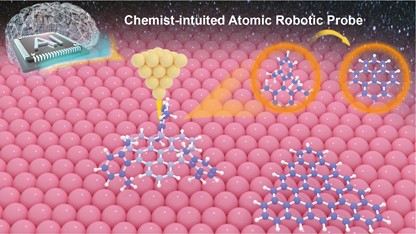
The research team, led by Associate Professor Jiong LU from the Department of Chemistry and the Institute for Functional Intelligent Materials, together with Associate Professor Chun ZHANG from both the Departments of Physics and Chemistry, at NUS, have introduced the concept of the chemist-intuited atomic robotic probe (CARP) by integrating probe chemistry knowledge and artificial intelligence to fabricate and characterise open-shell magnetic nanographenes at the single-molecule level. This allows for precise engineering of their π-electron topology and spin configurations in an automated manner, mirroring the capabilities of human chemists. The CARP concept, utilises deep neural networks trained using the experience and knowledge of surface science chemists, to autonomously synthesize open-shell magnetic nanographenes. It can also extract chemical information from the experimental training database, offering conjunctures about unknown mechanisms. This serves as an essential supplement to theoretical simulations, contributing to a more comprehensive understanding of probe chemistry reaction mechanisms. The research work is a collaboration involving Associate Professor Xiaonan WANG from Tsinghua University in China.
The research findings are published in the journal Nature Synthesis.
Prof Lu said, “Our main goal is to work at the atomic level to create, study and control these quantum materials. We are striving to revolutionise the production of these materials on surfaces to enable more control over their outcomes, right down to the level of individual atoms and bonds.”
“Our goal in the near future is to extend the CARP framework further to adopt versatile on-surface probe chemistry reactions with scale and efficiency. This has the potential to transform conventional laboratory-based on-surface synthesis process towards on-chip fabrication for practical applications. Such transformation could play a pivotal role in accelerating the fundamental research of quantum materials and usher in a new era of intelligent atomic fabrication,” added Prof Lu.
The figure above illustrates the chemist-intuited atomic robotic probe that would allow chemists to precisely fabricate organic quantum materials at the single-molecule level. The robotic probe can conduct real-time autonomous single-molecule reactions with chemical bond selectivity, demonstrating the fabrication of quantum materials with a high level of control. [Credit: Nature Synthesis].
Read the full article here.
